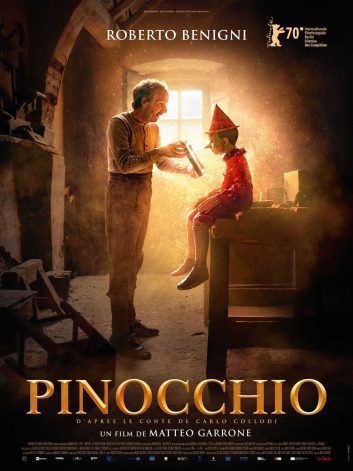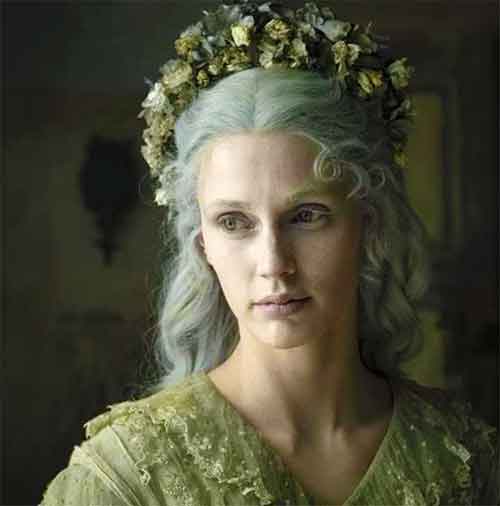 This 2019 film sought to adapt Carlo Collodi’s immortal ADVENTURES OF PINOCCHIO in its original un-Disneyfied form, i.e. as a dark and surreal fantasy. Let’s not forget that in Collodi’s 1883 novel Pinocchio is a brat who in the course of its highly episodic narrative is burned, hung, imprisoned and given to much bad behavior.
This 2019 film sought to adapt Carlo Collodi’s immortal ADVENTURES OF PINOCCHIO in its original un-Disneyfied form, i.e. as a dark and surreal fantasy. Let’s not forget that in Collodi’s 1883 novel Pinocchio is a brat who in the course of its highly episodic narrative is burned, hung, imprisoned and given to much bad behavior.
This sumptuously mounted 2019 co-production from mega-producer Jeremy Thomas and director Matteo Garrone hails, appropriately enough, from Pinocchio’s true birthplace: Italy. It’s as faithful an adaptation as possible given the highly fanciful nature of the book; certain portions were truncated (such as the abovementioned jailing), but the film replicates most of the particulars of Collodi’s narrative.
Roberto Benigni (who was responsible for a much lesser PINOCCHIO adaptation in 2002) plays Gepetto, a modest fellow looking to become a puppeteer. He gets his chance when he’s given a sentient piece of wood, which he carves into a boy and names Pinocchio. This puppet-boy, alas, is a bit of a twerp who impulsively wanders off to explore the world around him.
In this world animals can talk. One such animal is a child-sized cricket that periodically turns up to advise Pinocchio, who doesn’t listen; hence the film’s overriding message, which is the same as that of the book: obey one’s elders! The aforementioned hanging is one consequence of Pinocchio’s disobedience of the cricket, who entreats Pinocchio not to trust the word of a fox who offers the puppet-boy untold wealth—but of course Pinocchio ignores this advice, and ends up getting hung from his neck by a rope. Being wooden, he survives.
As we know, Pinocchio’s nose grows whenever he tells a lie. Not that truth-telling helps much, as he gets into all sorts of trouble due to his intransigent nature, and at one point transforms into a donkey. Luckily Pinocchio is watched over by a little girl fairy (Alida Baldari Calabria and Marine Vacth) who closely monitors his moral advancement, even as she herself grows steadily older. The story climaxes, as we all know, with Pinocchio getting sucked into the belly of a shark (rather than the whale of the Disney version) where he’s finally reunited with Gepetto, in route to becoming a flesh-and-blood boy.
This is a handsome and stately production, with an eye for detail and production design that has a lived-in feel. The pacing is erratic, and the use of CGI somewhat incongruous (when it comes to CGI it helps to have a Hollywood budget), yet overall the film is quite affecting, with Garrone’s painstakingly achieved sense of earthy realism serving to enhance the tale’s underlying strangeness. The soulful score by Dario Marianelli is another plus, accentuating the story’s emotional core.
 Speaking of which, Pinocchio, as played by Federico Ielapi, is a marvelous creation. His carved wooden surface is convincingly rendered with visible wood grain, albeit with very human eyes.
Speaking of which, Pinocchio, as played by Federico Ielapi, is a marvelous creation. His carved wooden surface is convincingly rendered with visible wood grain, albeit with very human eyes.
The many talking animals who turn up are depicted, somewhat questionably (and inconsistently), as humans with animal features or vice-versa. Included are a fox portrayed as a guy with whiskers, a snail represented by a woman dragging around a massive snail shell and a guy’s face set onto a fish’s body, whereas Pinocchio’s transformation into a donkey is presented as, simply, a donkey.
So it doesn’t all work. Yet the film hits its target enough that, as of 2020, it can safely be designated the premiere live action PINOCCHIO. It arrives, incidentally, just as further adaptations of the same material, by Guillermo del Toro and Robert Zemeckis, are in the works—quite simply: they’re going to have a hard time living up to this film.
Vital Statistics
PINOCCHIO
Archimede/Rai Cinema/Le Pacte
Director: Matteo Garrone
Producers: Matteo Garrone, Jean & Anne-Laure Labide, Jeremy Thomas, Paolo del Brocco
Screenplay: Matteo Garrone, Massimo Ceccherini
Cinematography: Nicolaj Bruel
Editing: Marco Spoletini
Cast: Federico Ielapi, Roberto Benigni, Gigi Proietti, Rocco Papaleo, Massimo Ceccherini, Marine Vacth, Alida Baldari Calabria, Maria Pia Timo, Massimiliano Gallo, Gianfranco Gallo, Davide Marotta, Teco Celio, Enzo Vetrano, Alessio di Domenicantonio, Nino Scardina, Massimiliano Gallo, Guillaume Delaunay, Giuliano del Taglia, Maurizio Lombardi, Domenico Centamore, Paolo Graziosi, Gigio Morra, Mauro Bucci, Sergio Forconi
